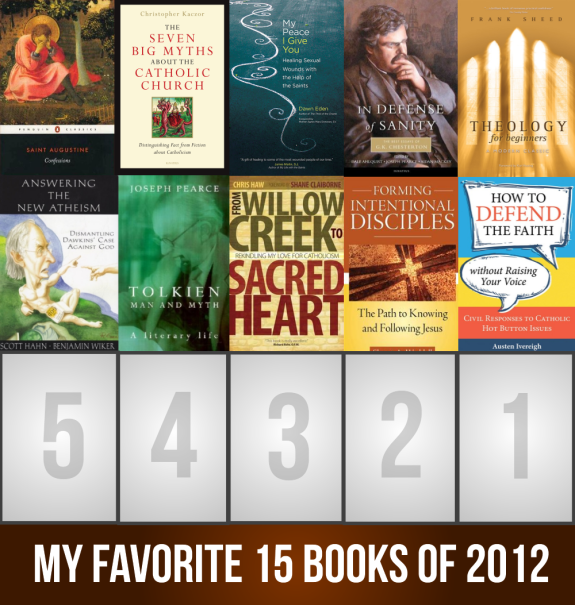NOTE: Check out favorite books #15-#11 and #5-#1. You might also enjoy my favorite books from 2011 and 2010.
“The habit of reading is the only enjoyment in which there is no alloy; it lasts when all other pleasures fade.” — Anthony Trollope
This was a relatively slow reading year for me. After knocking out 87 books last year and 108 two years ago, I only finished 54 titles this year. Granted, 2012 brought many wonderful diversions: our third child, Augustine, was born; I studied hundreds of hours for the Professional Engineering exam (which I passed!); I had several new writing and speaking commitments; and I worked on two large book projects. Considering all that activity I’m actually surprised I read as much as I did.
Yet 54 books still provide plenty of options for my annual favorites list. As with prior lists, these are my fifteen favorite books, not the most acclaimed, the most timeless, or the best-written. They’re simply the ones I liked the most, the ones I kept thinking about well after finishing.
Only about half of these books were published in 2012. But as C.S. Lewis says, novelty isn’t always good; newer books haven’t passed the test of time. Regardless, some of these older books may be unfamiliar to you and therefore “new” in the best sense of the word.
Also, this year I’m splitting the list up into three parts. The whole thing came ended up being 4,300 words which is way too long for a single post.
So with that, here are my favorite titles from 2012 (in descending order):
10. Answering the New Atheism: Dismantling Dawkins’ Case against God
Scott Hahn and Benjamin Wiker
(Emmaus Road, 2008)
Richard Dawkins is the de facto leader of the “New Atheism,” a strange breed of unbelief characterized by vicious, vulgar, and militant attacks on religion (mostly on Christianity, and especially on Catholicism.) In 2006, the Oxford biologist wrote his scathing book, The God Delusion. The book, a sacred text for New Atheists, is plagued by confused science, bad philosophy, and even worse theology.
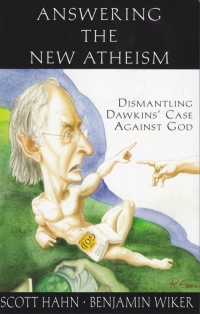 Dr. Scott Hahn and Dr. Benjamin Wiker are well aware of the book’s shoddy arguments. But they’ve troubled many of their otherwise well-formed students. So the two theology professors composed this book-length refutation, thus providing a definitive answer to the New Atheism.
Dr. Scott Hahn and Dr. Benjamin Wiker are well aware of the book’s shoddy arguments. But they’ve troubled many of their otherwise well-formed students. So the two theology professors composed this book-length refutation, thus providing a definitive answer to the New Atheism.
The book argues against Dawkins from many angles. It covers St. Thomas’ famous cosmological proofs for God’s existence. It shows how objective morality, required for Dawkins to call religion “bad,” itself ultimately points to God. In the book’s strongest section, the co-authors point out several flaws in Dawkins’ understanding of Darwinian evolution—of which Dawkins is perhaps the world’s most famous proponent—along with misunderstandings about probability and cosmological “fine-tuning.” They effectively show how evolution is not contradictory toward faith, and that using Darwinism to answer metaphysical questions is an ultimately futile pursuit.
Other books refute the New Atheists on higher intellectual grounds—I’m thinking of Dr. Ed Feser’s The Last Superstition: A Refutation of the New Atheism and David Bentley Hart’s Atheist Delusions: The Christian Revolution and Its Fashionable Enemies—but Answering the New Atheism is a fantastic popular-level primer.
9. Tolkien: Man and Myth, a Literary Life
Joseph Pearce
(Ignatius Press, 2001)
Acclaimed biographer Joseph Pearce begins profiling J.R.R. Tolkien by examining his early influences. Tolkien’s childhood years in the English countryside birthed a love for beauty, simplicity, and nature, all of which we see embodied in the idyllic Shire.
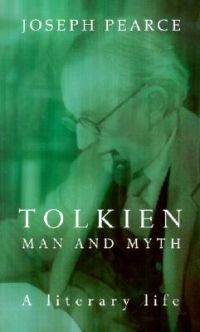 Later, however, Tolkien was forced to move into an industrial, urban city. He hated it. The crashing machines, suffocating smoke, and cold architecture all grated against his desire for the quiet, country life. The experiences formed a lifelong distaste for technology, which we also see in his epic Lord of the Rings trilogy.
Later, however, Tolkien was forced to move into an industrial, urban city. He hated it. The crashing machines, suffocating smoke, and cold architecture all grated against his desire for the quiet, country life. The experiences formed a lifelong distaste for technology, which we also see in his epic Lord of the Rings trilogy.
But it was Tolkien’s early conversion to Catholicism that most indelibly affected his writing. His faith gave him a deeply sacramental view of the world. It enabled him to see God in all things, sacred and secular. That’s why he could describe his seemingly-secular Lord of the Rings trilogy as “a fundamentally religious and Catholic work,” even though it never mentions God, Christ, or the Church. Yet behind Tolkien’s hobbits and dwarves, elves and wizards, lay many Catholic ideas. We see virtue, sacramental symbolism, and the constant hand of Providence, especially in the darkest moments. We also see grace building on nature, a specifically Catholic idea.
As both a Catholic and a literary Englishman, Pearce is the perfect guide to Tolkien’s faith-infused fiction. Most Tolkien biographies either skip his Catholicism or profoundly misunderstand it. Pearce gets it just right, and because of that his is my favorite biography of the Middle-Earth architect.
8. From Willow Creek to Sacred Heart: Rekindling My Love for Catholicism
Chris Haw
(Ave Maria Press, 2012)
From my earlier review:
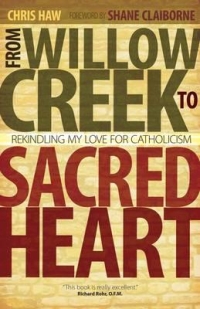 In his new memoir, From Willow Creek to Sacred Heart: Rekindling My Love for Catholicism, Chris Haw recounts how he went from leading worship at one of the country’s largest megachurches, to protesting on behalf of the homeless and hungry, and finally to a crumbling Catholic parish in one of America’s darkest cities…
In his new memoir, From Willow Creek to Sacred Heart: Rekindling My Love for Catholicism, Chris Haw recounts how he went from leading worship at one of the country’s largest megachurches, to protesting on behalf of the homeless and hungry, and finally to a crumbling Catholic parish in one of America’s darkest cities…
Sacred Heart Parish, in Camden, NJ, reawakened his childhood Catholicism. The liturgy’s paradoxical emphasis on the Cross and death, combined with his appreciation for Rene Girard and his “scapegoating” theology, ultimately drew him back in.
The book’s first half tracks Chris’ journey from megachurch evangelicalism to urban Catholicism. But in the second half, he offers profound meditations on themes like liturgy, violence, peace, death, and how to cope with the Church’s institutional dysfunction.
From beginning to end, From Willow Creek to Sacred Heart is poetic, honest, and raw. It’s one of the most beautiful spiritual memoirs I’ve encountered, bearing the same mesmerizing glow as Dorothy Day’s Long Loneliness and Thomas Merton’s Seven Storey Mountain. If you liked those classic books, you’ll enjoy this one.
7. Forming Intentional Disciples: The Path to Knowing and Following Jesus
Sherry Weddell
(Our Sunday Visitor, 2012)
When reading anything about the New Evangelization, whether it be from the popes or the recent Synod, a constant them is the need to encounter Christ. As Pope Benedict explains in his encyclical, Deus Caritas Est:
“Being Christian is not the result of an ethical choice or a lofty idea, but the encounter with an event, a person, which gives life a new horizon and a decisive direction…”
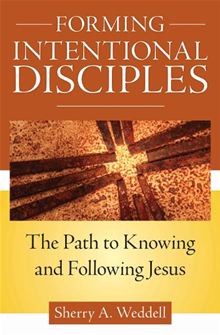 In my years as an Evangelical, this was common knowledge. Everyone knew that Christianity was grounded on a personal relationship with Jesus Christ. But as fellow-convert Sherry Weddell knows, many Catholic parishes miss this focus.
In my years as an Evangelical, this was common knowledge. Everyone knew that Christianity was grounded on a personal relationship with Jesus Christ. But as fellow-convert Sherry Weddell knows, many Catholic parishes miss this focus.
Over several years, Sherry has traveled the world, delivering workshops designed to help parishes become schools of discipleship. She’s collected all of her wisdom and success stories into this new book, which is perfect for priests, small groups, or individual study.
The book provides a road-map for parishes to become disciple-factories, yielding people who know and love Jesus and are excited to share him with others. The book gives several examples of this throughout the country, places where an emphasis on personal conversion has transformed a community’s spiritual tone and commitment level.
All of this makes Forming Intentional Disciples a must-read, practical guide to carrying out the New Evangelization. The movement is fundamentally about helping people encounter Christ and this book shows how parishes can facilitate that end.
6. How to Defend the Faith Without Raising Your Voice: Civil Responses to Catholic Hot Button Issues
Austen Ivereigh
(Our Sunday Visitor, 2012)
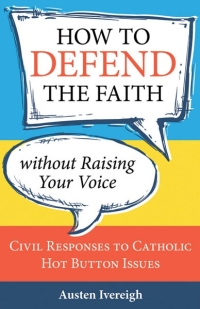 This helpful book offers a goldmine of advice on discussing today’s most contentious issues as a faithful Catholic. You’ll find chapters devoted to:
This helpful book offers a goldmine of advice on discussing today’s most contentious issues as a faithful Catholic. You’ll find chapters devoted to:
- The Church and Political Life
- Homosexuality and Contraception
- Equality and Religious Freedom (including the recent HHS mandate)
- Assisted Suicide
- Clerical Sex Abuse
- Defending the Unborn
- Catholics and AIDS
- The Meaning and Purpose of Marriage
- Women and the Church
However, this book is not just apologetics. It’s a guide to discussing these contentious topics with reason and grace. Effective strategies like “re-framing” and “positive intention” help diffuse heated conversation and pave the way for more productive dialogue. Watch below for a deeper review:
Click here for favorite books #5-#1.
What were your favorite books of 2012?

